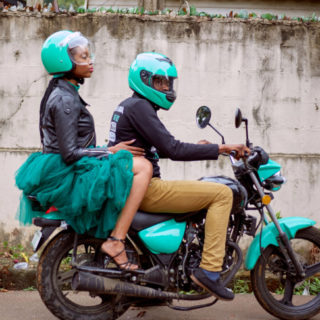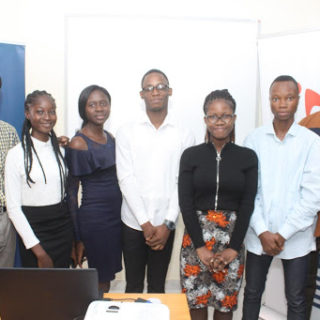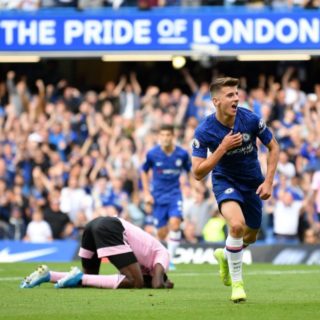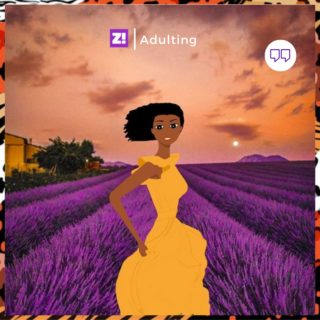I’m one of those weird people who take pride in finding and following successful artists from my first listen. In the case of Burna Boy, it happened the day I heard “Freedom Freestyle” in 2011 – during one of those music-sharing sessions that replaced lectures while I was studying at the University of Ado-Ekiti.
Since then, it’s been easy, hard and impossible – in different phases – to make a case for Burna’s talent and his inevitable ascension to the upper echelon of African popular music.
After years of being an enfant terrible, 2018 will be remembered as the year Burna Boy got his act together and made that case for himself. And it has become apparent since that Burna himself knows this.
Barely days into the new year, Coachella released its list of performers for the 2019 edition. Of the dozens of performers, two Nigerians – Burna Boy and Mr Eazi made the cut. In fairness, it’s deserved recognition.
Apart from Africa’s pop princes, Davido and Wizkid, the two have covered the most international ground in the past year – Eazi with “Lagos To London” and Burna with “Outside”, “Ye” and a host of seminal collabs. But only one of the two saw it fit to ask for greater recognition.
The story is relatively well-known. Burna took to Instagram to ask that Coachella put his name in bigger fonts to reflect his standing as an African Giant in line with his “vision of the future of Africa and African Music”. Burna felt he was being sold short. Not many people agreed.
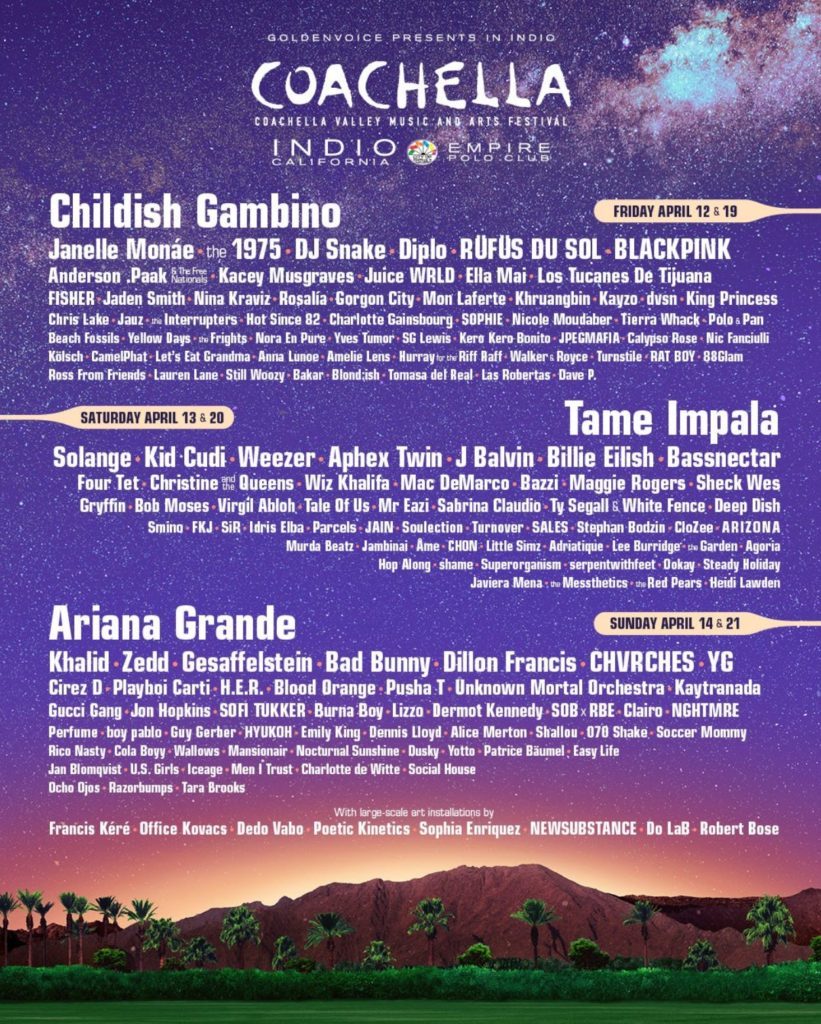
Coachella 2019 promo flyer – Burna Boy’s name is in the third line on the third row of names. 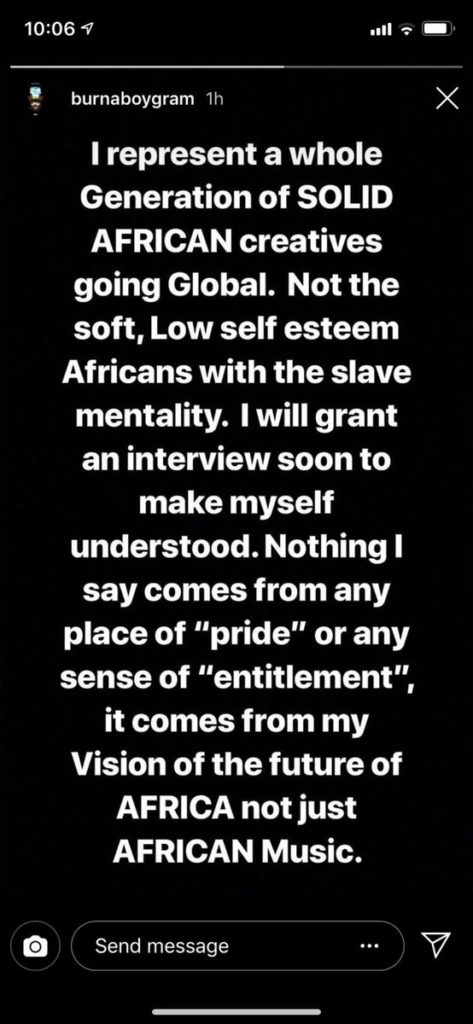
Burna’s reaction to the Coachella Flyer 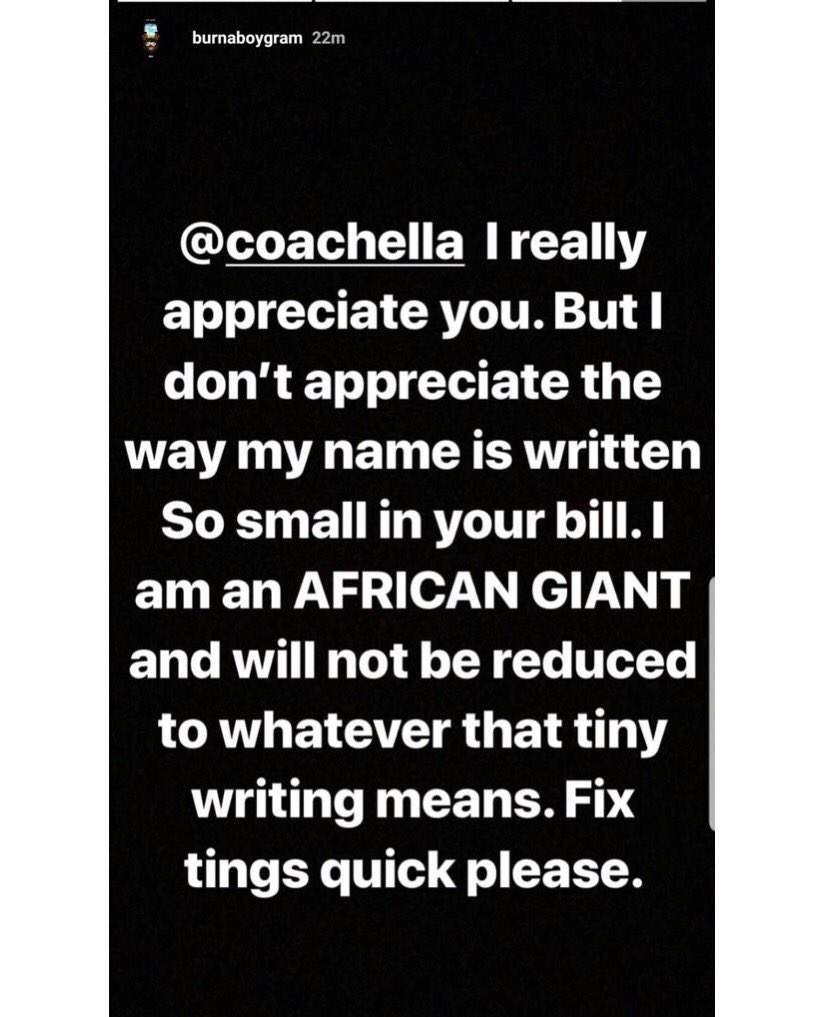
Burna’s reaction to the Coachella Flyer
As with everything that happens on Instagram Stories, time quickly ran out on that conversation. That is until last weekend.
Since 1999, Coachella, or the Coachella Valley Music & Arts Festival, as it’s officially known, has grown into one of the biggest music festivals in the world. Over two weekends, insane crowds come out to watch the world’s biggest musicians in the middle of the Colorado desert. An estimated 250,000 people came out for the 2017 edition.
If footage of his set on Sunday morning is anything to go by, barely 1% of those people came out to watch Burna perform.
After doing several visits to US radio stations to promote his set, including an interesting visit to Sway In The Morning, Burna arrived the Coachella stage with his crew, dripping in an interesting fit designed by Kenneth Ize that had him looking like he was going to fight Batman after the show.
The man of the hour (or 20 minutes, depending on how long his set was) kicked things off with his first hit of 2019; “Killin Dem”, a song that was made for dancing and boisterous partying.
On any day in Lagos, the Burna/Zlatan collab is enough to turn a funeral procession into a carnival. But on a sunny day in California, it’s just another song.
At times, the crowd seemed like a group of seat fillers at award shows; random people employed to give the illusion of a bigger audience. At others, they seemed genuinely disinterested; shuffling in the sun, a wave of a flag or a shirt the only sign that they noticed someone was on stage. This was definitely not big font energy.
There are obvious explanations; standing in the California sun is not one of the things fans look forward to, and as such, the biggest artistes get the night slots when fans can rave without a ball of fire hovering. There’s a reason Beychella happened at night.
To be fair, Burna did his best. He worked that Zanku in a way that Zlatan would be proud of and brought back one or two oldies. He did get the crowd moving to “Ye” and engaged whoever was listening by singing out some of the more politically-charged lyrics a capella. His performance of “Dangote” was impassioned. But it just wasn’t to be.
The real reason is a lot closer to home. African music is on the rise. But just how high it’s risen is open to discussion. Today, artists like Wizkid and Davido are familiar names in global music circles. In response to the renewed interest in African music, Spotify launched its Afro Hub, an entire block dedicated to content from and inspired by Africa. But these are symbolic victories, positive steps in the right direction, more than anything else.
Burna’s request for bigger fonts on the Coachella flyer implied belief that his music was big enough on a global level to stand font-to-font with the Billie Eilishes and Tame Impalas of the world. If quality is the parameter, I’m inclined to agree.
Burna Boy has joined in a league of artists who glide through genres and make inspired poignant music. That said, he is not nearly big enough to convince a bunch of inebriated American adolescents to stand in the sun on a Sunday morning. African music just isn’t there… yet.
There are levels to this shit. Coachella is synonymous with grand stage designs and elaborate sets – something that few African artistes not named Mr Eazi can afford or be bothered to put up.
It’s the same as having a Nigerian hit song in the US – it takes a level of organisation, resources and a level of deliberate thinking that we have not shown or achieved. Our music has gotten some interest in the last few years – but more in the sense of an exotic variety than a dominant force.
Davido may be proud to have the biggest Nigerian song in the US – but the silent subtext is that it has taken him two years and two US radio tours to get to No. 13 on the Billboard R&B/Hip-Hop Hot Airplay charts.
Nigerian music is in a place where it has a lot to prove. It’s the cool, trendy new guy at a university. He’s the hot new thing, eager to claim his place in this community
Today, being the biggest artiste in Nigeria doesn’t translate into much else. Maybe Coachella’s humbling of an African giant was the reminder Burna and everyone else needed. There’s much work to be done.

